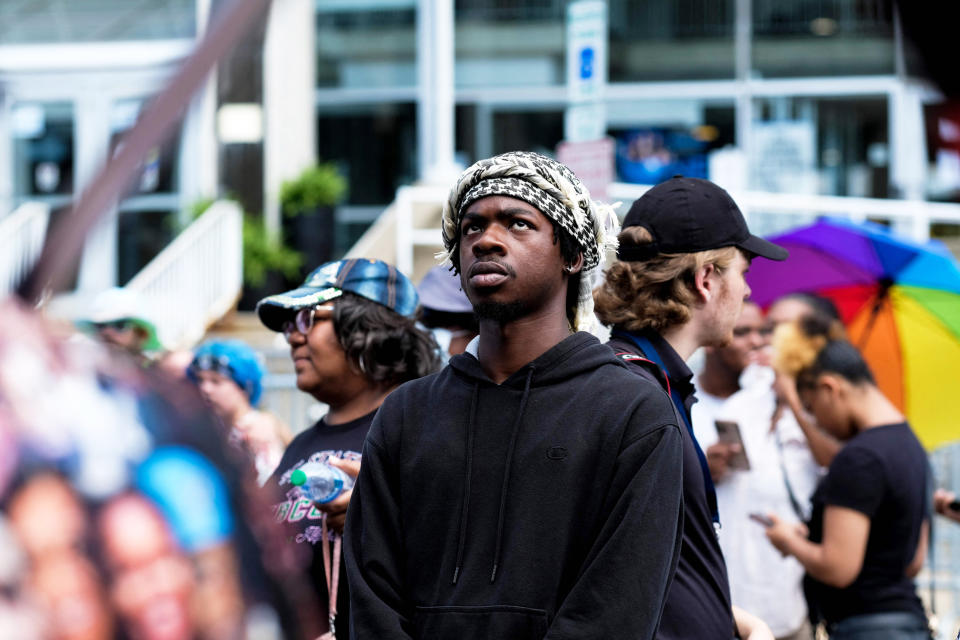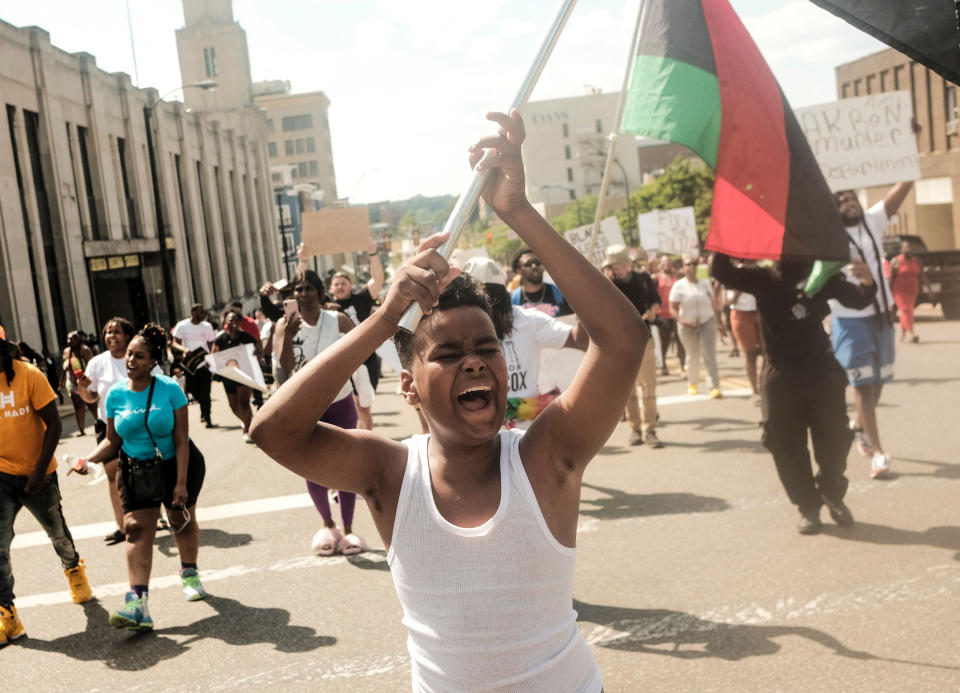Jayland Walker’s death has traumatized Black people in Akron, Ohio. Community leaders are finding ways to help.
Black leaders in Akron, Ohio, are focusing on ways to help their community heal following the death of Jayland Walker, 25, an unarmed Black man shot 46 times by police last month.
While his death came as a shock to residents, those who lived in the community for decades say that the racial violence in Akron is all too familiar. The violence, paired with the community’s heightened fear of police after Walker’s brutal death, has led advocates to create health and wellness activities to help those suffering from racial trauma — which can lead to post-traumatic stress disorder, anxiety and depression, experts say.
Among those coping and finding ways to address the trauma of Walker’s death is Brian Turner, the former dean of Buchtel Community Learning Center, the high school Walker attended. Turner, whose role often involved disciplining students, said Walker was a good student who never got in trouble.
“I just know that he was a very respectful, mannerable young man when he was in the building with his friends,” he said.
After learning of Walker’s fatal shooting, Turner, 59, said he looked for solace. He joined more than 300 attendees who marched in downtown Akron during a peaceful protest organized by the NAACP. While he was unable to attend Walker’s funeral, he said, individuals in the community are expressing “a number of different things,” including anger and hurt.

“We’re definitely distraught,” he said. “The biggest concern is, ‘Why can’t we be dealt with humanely when you’re pulling us over?’”
Walker’s fatal shooting is very triggering for Turner, who is also a former military police officer. During the spring of 1994, Turner said, he was racially profiled by two white officers — one training officer and the other a rookie — noting that the incident could have escalated if he wasn’t wearing his military uniform.
“It was really a racial profiling type of situation in which they were following me,” he recalled. “I made three turns. They made three turns. I said, ‘OK, these guys are getting ready to light me up.’”
The police officers explained they couldn’t see the entire car tag on Turner’s license plate, he recalled — which led him to feel they had no valid reason to pull him over.
Myron Lewis, 59, a retired chemical dependency counselor in Akron, said he too is triggered by Walker’s death. Lewis, who previously worked in juvenile substance abuse prevention, said he met Walker after giving a motivational speech at his high school. He said that he grew up with a handful of Walker’s relatives — even playing football with one of his cousins. Following Walker’s death, Lewis also marched in a peaceful protest in downtown Akron and admits it’s been difficult.
“If I wanted to in this last month, I could have attended six funerals,” Lewis said referring to those in his community who had died from gun violence and natural causes. “It’s just been a rough time.” He said he also sought therapy to address the emotional trauma he experienced from gun violence in his community.
With Walker’s death affecting many in Akron, it would seem that there would be more of a push for mental health counseling. However, Lewis says, seeking therapy to deal with trauma is still a very taboo subject within the Black community. “A lot of people will say, ‘Well, you know, if the police would just stop shooting, we wouldn’t even need to get mental health counseling,’” he said.
John Queener, a psychology professor at the University of Akron and an executive director of the Minority Behavioral Health Group, said that one of the reasons why Black individuals don’t regularly seek therapy is the belief that “whatever happens in the family stays in the family,” or that it’s best to keep personal matters private. He said that there is an overwhelming racial disparity in the mental health community because of a lack of culturally competent mental health care providers.
For example, in Summit County, which includes the City of Akron, many Black boys at the local juvenile detention center who have behavioral issues are diagnosed with conduct disorder or oppositional defiant disorder. This diagnosis is done by in-house counselors based on an assessment not developed for them, Queener explained, which often leads to many Black boys being placed in the criminal justice system. “Whereas their white counterparts may get [diagnosed with] a mood disorder, and they are more likely to get a diversion program,” he added.

The cultural stigma of therapy, along with the need for more qualified therapists who can better evaluate the Black community, are what Queener says mental health professionals need to address. He believes that if therapists develop a system that will meet the needs of the Black community, then more members will attend and get help.
Aside from mental health counseling, community leaders are finding unique ways to address the trauma of Walker’s death. As the executive director of Freedom Bloc, a nonprofit group created to uplift and empower the Black community, Rev. Raymond Greene is stepping up to provide activities that promote mental health and wellness.
The group’s program offers residents activities such as free manicures, massages and yoga. There are also opportunities for residents to speak with mental health counselors and attend a grief support group at no cost.
Since its initial launch July 12, Greene said, more than 60 people have participated in activities. The program is scheduled to continue every week until Thanksgiving and may even extend through the Christmas holiday for those who experience seasonal depression.
In addition to his local efforts, he is working with Black Organizing for Leadership and Dignity, a national social justice organization, to find ways to address the national mental health crisis, specifically within the Black community.
“We realize that a lot of the younger community wants to be involved in these protests and want their voices heard — but that they are hurt,” Greene said. “They are traumatized. Not only by this situation, but by current living conditions of poverty. We needed to do something to help people heal.”
Queener agrees that many are hurting, adding that part of the healing process for his Black patients who suffer from racial trauma is to have them acknowledge their emotions and realize that they do have power, even while feeling hopeless.
“An optimal way to understand the Jayland Walker situation is to say there’s nothing wrong with Black people,” he said. “There’s nothing wrong with Black men.” Black people are often seen negatively in society, he added, and the best way to deal with this challenge is to build up the Black community.
Queener, who has three sons, said he’s had conversations with them about racism and being Black in America, starting from when they were as young as 8.
While health and wellness activities, coupled with some much-needed therapy, have been helpful to many, Greene said these treatments are not enough to help the close-knit community of Akron to fully heal. That’s why his organization is also working on ballot initiatives to change policies. That includes providing leadership development to create potential candidates in the community who will run for office and pass policies that better address the needs of the community.
“We need policy to ensure that this never happens again,” he said of Walker’s death.

